

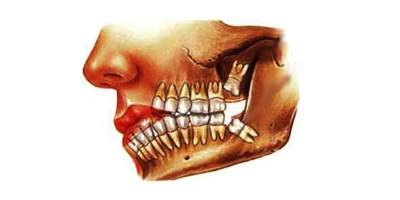
By the age of 18, most adults have 32 teeth; 16 teeth on the top and 16 teeth on the bottom. Each tooth in the mouth has a specific name and function. The teeth in the front of the mouth (incisors, canine, and bicuspid teeth) are ideal for grasping and biting food into smaller pieces. The back teeth (molar teeth) are used to grind food up into a consistency suitable for swallowing.
The average mouth is made to hold only 28 teeth. It can be painful when 32 teeth try to fit in a mouth that holds only 28 teeth.
These four other teeth are your third molars, also known as "wisdom teeth." These can become problematic.
Wisdom teeth are the last teeth to erupt within the mouth. When they align properly and gum tissue is healthy, wisdom teeth do not have to be removed.
Unfortunately, this does not generally happen.
The extraction of wisdom teeth is necessary when they are prevented from properly erupting within the mouth.
They may grow sideways, partially emerge from the gum, and even remain trapped beneath the gum and bone. Impacted teeth can take many positions in the bone as they attempt to find a pathway that will allow them to successfully erupt.
These poorly positioned impacted teeth can cause many problems. When they are partially erupted, the opening around the teeth allows bacteria to grow and will eventually cause an infection. The result: swelling, stiffness, pain, and illness. The pressure from the erupting wisdom teeth may move other teeth and disrupt the orthodontic or natural alignment of teeth. The most serious problem occurs when tumors or cysts form around the impacted wisdom teeth, resulting in the destruction of the jawbone and healthy teeth. Removal of the offending impacted teeth usually resolves these problems. Early removal is recommended to avoid such future problems and to decrease the surgical risk involved with the procedure.
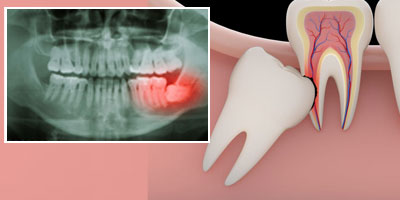
Some wisdom teeth may have no symptoms but there may be a problem developing or there is high risk of a problem developing that you may be unaware of.
There is strong evidence to show that wisdom teeth that are mesially or horizontally positioned that have not erupted fully have a high risk of decay occurring within the wisdom tooth and also to the tooth in front.
If left alone the decay may get to the extent that you may develop pain from both teeth.
The decay may get to the extent that the tooth in front has to be removed as well. The same may occur to the bone support around these teeth (periodontal disease). The most serious problem occurs when tumors or cysts form around the impacted wisdom teeth. A cyst occurs when fluid fills the sack that normally surrounds a developing wisdom tooth and can slowly increase in size.
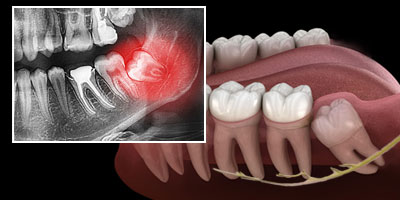
An impacted tooth may be close to major nerves. When the tooth is extracted, the nerve may become bruised. This can cause pain, numbness, tingling and loss of feeling in teeth, gums, cheeks, lips, chin, tongue and around the upper and lower jaw.
But trying to avoid this treatment is not a solution. We do now have 3-D cone beam imaging (CBCT).
CBCT allows us to basically perform the extraction virtually ahead of time in order to make the procedure that much safer.
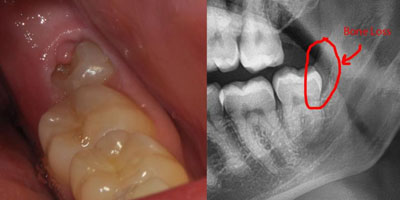
An impacted wisdom tooth might break through the gums, and part of the gums can be seen. This is called a partially impacted wisdom tooth. A partially impacted wisdom tooth may cause food to become trapped and can make cleaning the tooth more difficult. For some people, a partially impacted tooth is very painful
Dental sedation is a method used to block pain and help patients relax during a dental procedure. For a patient to receive the best dental care possible, sedation is often necessary during wisdom teeth extractions to ensure the patient remains calm and comfortable.
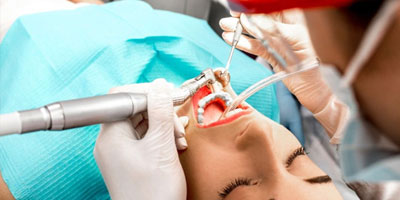
Sedation anesthesia suppresses your consciousness during the procedure. You don't feel any pain and will have limited memory of the procedure. You'll also receive local anesthesia to numb your gums.
Nitrous Oxide: It is often referred to as “laughing gas” and is taken by inhalation through an oxygen mask.
This method offers an increased level of control over how aware a patient is because it has a fast application but also wears off quickly. Once it wears off, the patient is conscious and aware as if waking from a deep nap.
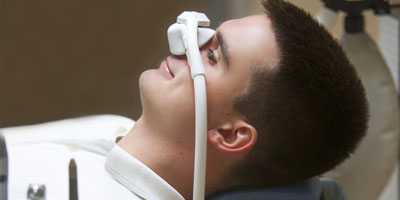
In most cases, the removal of wisdom teeth is performed under local anesthesia, IV sedation or general anesthesia.These options, as well as the possible surgical risks, will be discussed with you before the procedure is performed. Once the teeth are removed, the gum is sutured. To help control bleeding, gauze is placed in your mouth. You will rest under our supervision in the office until you are ready to be taken home.
Upon discharge, your postoperative kit will include postoperative instructions, a prescription for pain medication, antibiotics, and a follow-up appointment in one week.
Usually it will be necessary to take a few days off work and avoid strenuous exercise for this time. Depending on the type of anaesthetic used you may well not be able to drive (24 hours after intravenous sedation and for 48 hours after a general anaesthetic).